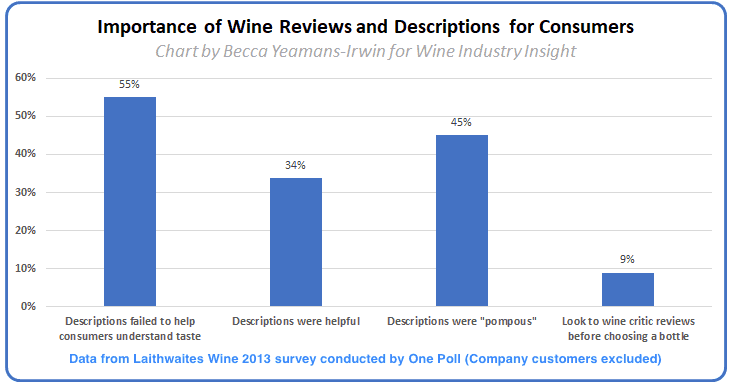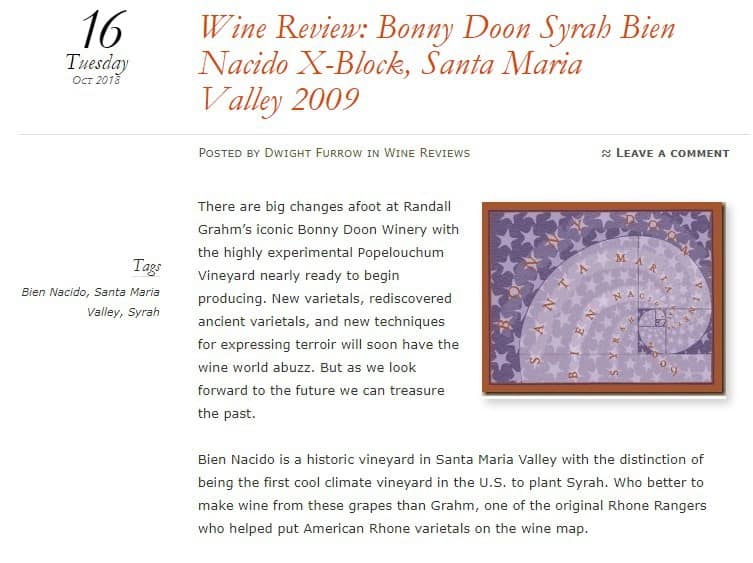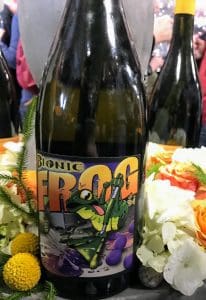I have a confession to make. While I’m no longer in the retail game, I spent over 7 years in it working as a grocery store wine steward and an associate at a major wine retailer. In that time working the floor and talking to thousands upon thousands of customers, I never once had a customer ask me for a wine they saw reviewed on a blog.

Not once.
Oh I’ve had numerous people come in with Wine Spectator’s Top 100 list or a copy of award winners from local competitions like the Seattle Wine Awards. Local newspaper and magazine articles such as Andy Perdue’s Top Wines Under $30 and Sean Sullivan’s 30 Most Exciting Wines in Washington also brought people in hunting.
But never once did I have a customer show me their phone with a wine review from a blog. Or an Instagram pic. Or a Twitter wine chat recommendation.
Never.
I share this confession because as I settle into full-time writing, I’m wondering “What is the point in doing wine reviews?”
Do Consumers Care?
Jeff Siegel, the Wine Curmudgeon, recently asked if we’ve “reached the end of wine criticism?” . He highlights a 2013 Laithwaites Wines Survey that shows only 9% of wine drinkers actively used wine reviews to make a decision. In fact, rather than being helpful, the majority of the 1000 wine drinkers surveyed found reviews to be of little use.
Becca Yeamans-Irwin (The Academic Wino) created a chart showing the results of the Laithwaites’ survey for Wine Industry Insight.

Chart made by Becca Yeamans-Irwin for Wine Industry Insight. Published 10/26/2018
When I step back and think about how I approach reviews as a consumer, I realize that I hardly use reviews at all.
Context or Empty Text?
It’s not that I don’t read reviews. I’m reading wine stuff all the time and pay for subscriptions to Decanter, JebDunnuck.com, Vinous Media, Burghound, Jancis Robinson’s Purple Pages and others.
But I’m not reading any of those for reviews. If anything, these sites are like porn mags where I am actually just reading them for the articles.
When an article includes tasting notes with descriptors about bouquet, body, fruit, etc, my eyes gloss over them. Instead, I’m looking through the review for something unique or interesting about the wine–something about its story that is worth my attention.
When I was selecting sample reviews for my 2017 Bordeaux Futures posts, the ones I picked had added details about the vintage or chateaux such as if they had frost damage or how this wine compares to the style of years past, etc. While I often found the notes of critics like James Suckling to be virtually useless, other writers like Jane Anson of Decanter gave me the context I craved.
I also regularly read numerous bloggers who do wine reviews such as Jeff Leve’s The Wine Cellar Insider, Dwight Furrow’s Edible Arts, Dave Nershi’s Vino-Sphere, Tom Lee’s Zinfandel Chronicles and Robin Renken’s Crushed Grape Chronicles.
The writers and bloggers that give me context, I follow. The ones that just spew out tasting notes and numbers, I don’t even give a second thought to.
Here’s an example of a wine blogger I follow.

While I was familiar with the Bien Nacido vineyard in the Santa Maria Valley, I didn’t know that it was the first cool-climate US vineyard to plant Syrah. This great tidbit adds context to Dwight Furrow’s review of the Bonny Doon Syrah Bien Nacido X-Block.
Even if Furrow didn’t like the Bonny Doon Bien Nacido Syrah, those added details about the wine intrigues me enough to want to try it.
It wasn’t his description of the wine, the “rich, smoked meat with mint highlights” or “luscious, peppery burst of fresh fruit”, that ultimately influenced me. Nor was it his 92 point score. There are many wines that have savory, meaty flavors and pepper notes. Likewise, the cliche “a dime a dozen” doesn’t even come close to expressing how many “92 point wines” there are out in the world.
But the story he shared about the wine–the uniqueness of the Bien Nacido vineyard and the framing of this as a “treasure of the past” that can be used to view Grahm’s new projects–gave me a reason to want to try this wine above all the other savory, meaty and peppery 92 pointers out there.
Why Do I Review Wines?
Being a blogger myself, these sentiments might be a bit of “biting the hand that feeds me”. I mean, shouldn’t I be banging the drum for more people to pay attention to wine reviews? I do, after all, even have a samples policy. Come on! Get with the program LeBeau!
But though I’ve been actively blogging for over a year, it’s hard for me to disengage from the mentality of a consumer and reader of blogs. Nor can I discount my experiences working in the industry. It is those experiences, and dealing with other consumers, that have made me hugely skeptical of the entire concept of “wine influencer”.

Lord knows that there are A LOT of stories that can be told about Randall Grahm and his wines.
However, I do think that wine writers have influence. But, as I mentioned with my example of Furrow’s review, it’s not in their tasting notes or numbers.
I might not walk into a wine shop with Furrow’s review on my phone, but the story of Bonny Doon’s Bien Nacido Syrah will resonate in my mind when I see the label or name on a wine list.
Even though I won’t remember the details of his tasting note at all, I will remember the story and context that Furrow shared about the wine.
THAT is the true influence of a wine writer.
These experiences are what shape my own 60 Second Reviews and how I expect readers to approach them.
To be brutally honest, folks could stop reading them after the Geekery section and make them 30 second reviews.
It’s that first section where I strive to give you something that either intrigues you about the wine or gives you a reason to think about it differently.
The tasting note that follows is mostly for my own edification. It’s there to force me to pay attention to what I’m tasting versus just drinking it. A lot of the language I use in those notes (like medium-plus acidity, firm tannins, etc) is language that I need to use for my blind tasting examinations. It’s not the same language that you are going to use when tasting the wine and my note is likely going to be quite different from yours in other ways as well. Wine is subjective and intensely personal.
Rating With My Wallet
The Verdict section, as I mentioned in my post Why I Don’t Use Scores, is my reconciliation of how I feel about the wine with what I paid for it.
I don’t expect to ever get many samples sent to me–and really, after the “hand biting” of this post, why would a PR firm want to? So the vast majority of wines I review will continue to be things that I bought with my own money from shops, wineries and restaurants.
Some things I’m going to feel really good about buying. Other wines are going to feel like I way overpaid for them. I’ll share that frank assessment because you’re likely not going to be getting samples sent to you either.
With every wine, it’s going to be your wallet and your taste buds that determine if it’s worth it. Not a tasting note, not a wine review and certainly not a numerical score.
That is why I don’t want to waste your time with empty text.


